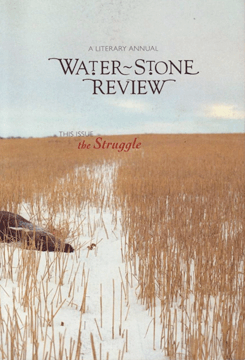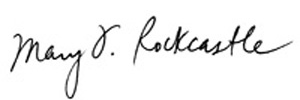From the Executive Editor
The Struggle (v. 7)
 Readers familiar with Water~Stone Review will notice a change in our design this year. The magazine is slightly larger – in order to enlarge the font size and make the text more readable, and to sharpen our visual identity as a magazine. Being an annual has its advantages, and we’ve always been proud of the fact that we have the look and feel of a book. First, however, we are a literary review, and we want to signal that in our design. We’ve retained the beauty and most of the signature elements of our original design – thanks to Andrea Hyde and the DesignWorks team at the Minneapolis College of Art and Design.
Readers familiar with Water~Stone Review will notice a change in our design this year. The magazine is slightly larger – in order to enlarge the font size and make the text more readable, and to sharpen our visual identity as a magazine. Being an annual has its advantages, and we’ve always been proud of the fact that we have the look and feel of a book. First, however, we are a literary review, and we want to signal that in our design. We’ve retained the beauty and most of the signature elements of our original design – thanks to Andrea Hyde and the DesignWorks team at the Minneapolis College of Art and Design.
Although we don’t do specific theme issues for Water~Stone Review, one or more compelling themes usually emerge. Of course, the deep concerns of the human condition are always the predominate subject. Given that, a number of questions and issues rise to the top.
In this issue, the writers we chose seem most preoccupied with the ways in which we struggle – with the larger world, with others, with ourselves. The “we” in this equation has a large scope: it includes our lives as humans, as animals, as part of nature. We struggle with nature – our own and with physical nature; we struggle with others, usually in relationship; we struggle with the larger world. And then we try to cope. We reach out for comfort and hope. We go on.
What are these sources of comfort and hope? Art, of course. For Irish poet and essayist Eavan Boland, the lyric poetry of Edna St. Vincent Millay gives her insight into her sense of herself and her understanding of the poetry of this century. The teacher in John Edgar Wideman’s “Writing Lesson,” teaches others “the truth of your experience, your witness.” For Southern writer William Gay, writing is “a continual act of faith. Like walking out on a wire and having the confidence to put one foot in front of the other.”
“I want to mention how much love matters,” says Kate DiCamillo in her interview. Paying attention also matters. As does imagination. And different points of view. These points of view transform us, writes Reg Saner, “the way a hand is changed in coming to rest on another.”
The two winners of this year’s Brenda Ueland Prose Prize, judged by Robert Olen Butler, are “Hunger” by Cinthia Ritchie and “The Music of the Storm” by Judy Copeland. We are happy also to publish “On Poetry” by Su Smallen, which was selected for an honorable mention.
Our three writers’ interviews are with Kate DiCamillo, the 2004 Newbery Medal winner of The Tale of Despereaux: Being the Story of a Mouse, a Princess, Some Soup, and a Spool of Thread; William Gay, author of two novels and an award-winning short story collection; and Jane Jeong Trenka, author of a memoir, The Language of Blood, which won a 2004 Minnesota Book Award.
A new feature we’re adding this year is called Field Notes: Private Voices/Public Lives. In it, we will publish an excerpt from the journal/notebook/sketchbook of a person – not necessarily a writer – who’s accomplished something of significance to society. We’re particularly interested in those individuals who are compelled to travel into new territory – for adventure, discovery, knowledge. Because the Graduate Liberal Studies and Creative Writing at Hamline University is grounded in interdisciplinary inquiry and study (writers and scholars moving between and among disciplines as well as genres), we thought this would be a fitting and interesting extension of the work we do in our graduate classes. Who better to launch this feature than famed Arctic explorer Ann Bancroft, whose personal journals have sustained her for years and whose on-line, daily postings from the field have taught and inspired hundreds of students and adults interested in polar exploration?
In his beautiful poem, “The Mask,” Ray Gonzalez asks a number of telling questions that reverberate throughout this collection. I hope they will do so for you as well. What have you saved? What have you given up? What have you kept? How have you lived?

